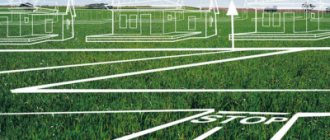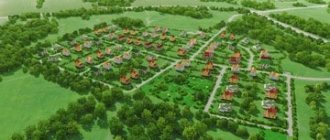Whose territory is this?
Who is the owner? The owner of such lands is the state, on whose balance sheet all forest zones of the Russian Federation are listed. Forests are in federal ownership, as stated in Article 8 of the Forest Code, but can be transferred to the responsible management of municipalities on the basis of permanent, unlimited use rights. Only the Government of the Russian Federation can dispose of forest lands on the basis of Resolutions. A number of decisions are made by the Ministry of Forestry, reporting to government agencies.
The regulations for all permissible actions are guided by the norms of the Forest Code of the Russian Federation (LC RF), adopted on December 4, 2006 under No. 200-FZ and Article 101 of the Land Code of the Russian Federation. All forest zones are subject to cadastral registration, alienation procedures are necessarily registered in Rosreestr and are allowed only on the basis of federal public hearings, with an appropriate decision of the Government of the Russian Federation based on the provisions of Article 1 of the Land Code of the Russian Federation.
The exception is forest zones that act as security zones for railway tracks, which may belong to Russian Railways. Suburban green areas are often included in the context of a populated area and belong to the lands of settlements, managed by the local administration.
If forests are artificial, they can be reproduced by owners of artificial reservoirs and dacha farms, but to a limited extent, with the consent of the municipality.
Read about what applies to forest lands here, and from this article you will learn about the legal regime for their use, as well as who can become the owner of such areas.
The concept of forest and its types
Definition 1
Municipally owned forests are forests owned by municipalities under the right of ownership.
Forest is understood as an ecological system or natural resources in the context of their use, conservation, protection and reproduction.
In accordance with the Forest Code of the Russian Federation, a municipal entity acts as one of the participants in forest relations.
On behalf of municipalities, municipal government bodies take part in forest relations within the framework of the powers vested in them in accordance with regulations.
In accordance with the Forest Code of Russia, forests can be located in the forest fund on lands that are divided into forest and non-forest. Forest lands mean lands on the territory of which there are forests and lands that are used for reforestation, for example, burnt areas, wastelands, clearings, etc. Non-forest lands mean those lands that are necessary for the development of forests, for example, roads, clearings, etc., and lands that are not convenient for use, for example, rocky areas, swamps, etc.
Finished works on a similar topic
- Course work: Forests of municipal property 420 rub.
- Abstract Forests of municipal property 260 rub.
- Test work Forests of municipal property 250 rubles.
Receive completed work or specialist advice on your educational project Find out the cost
In addition, forests may be located on lands that do not belong to the forest fund lands. In this case, we are talking about agricultural lands and other lands determined in accordance with the Land Code of the Russian Federation. Forestry legislation provides for a special procedure for the use, protection, conservation and reproduction of those resources that are located on lands that are not part of the forest fund.
Terms of a transaction
Transfer of forest land into ownership is impossible. But exceptions are allowed to this rule. Registration of ownership is permissible for lands that can be transferred to another category. Suburban green areas can be quite easily converted into settlement land. True, the government requires compliance with legislation that provides for their exclusive use for their intended purpose - as forest recreation areas for citizens.
More often, burnt areas - areas after a fire, or open spaces - areas after deforestation are registered as the property. Re-registration is permissible if restoration is not planned in such treeless areas. Sometimes forest areas are interspersed with coppices that do not have woody vegetation and can be converted into agricultural land, which can be purchased or privatized.
The main condition for provision is that the land mass has ceased to be of value to the state, and sometimes its maintenance becomes unprofitable. If an applicant for registration of a site submits a project for the development of a forest zone, which is recognized as relevant, he can count on receiving a permit.
The grounds for recognition of the right to transfer land to another category may be:
- An application submitted to a government agency.
- Attached documents confirming the unsuitability (other reasons for unprofitability) of using the specified part of the forest. With the application of the zone development project.
- The decision of the Government of the Russian Federation on the transfer of land to another category, with subsequent registration of ownership.
Sometimes, instead of ownership, it is more advisable to issue a long-term lease of a forest area for its intended use.
How can I apply?
The procedure for registering property rights follows a certain algorithm, the main part of which is focused on obtaining permission from a government order to transfer a site to another category. This requires:
- Select a suitable area of woodland that cannot be used as forest. This could be a clearing after clearing, a fire site with dead trees, swampy lands or other areas not overgrown with trees.
- Schedule an examination of the selected area and obtain expert opinions. It is advisable to have at least three different expert reports, which will indicate that the established zone does not meet the requirements for a forest area.
- Establish the amount of damage when transferring land to another category. This amount will need to be paid by the applicant.
- Submit a request to the Ministry, indicate detailed reasons for transferring land to another category (indicate which one) based on examination reports. It is necessary to enter the cadastral address and other parameters of the forest plot.
- Attach a similar application addressed to the Government bodies of the Russian Federation, as well as examination acts, a notarized copy of the passport, an extract from the Unified State Register of Legal Entities and a copy of the package of constituent documentation (for legal entities). A private individual must provide a license and other documents authorizing the relevant activity.
- The submitted application is reviewed by the Minister, who attaches his resolution.
- At his discretion, the request is returned to the applicant on the basis of a reasoned extract, with reference to sources of legislation, or submitted to the authorities of the Government of the Russian Federation for consideration.
The application must include special wording that gives it the character of an official document . Reliance on facts confirmed by expert opinions is required. The petition part indicates a request for permission to transfer land to another category and for subsequent redemption into ownership. In general, the document is drawn up in free form, since there are no special regulations for it.
The following must be included in your application:
- Reasons for the impossibility of using the site for its intended purpose: burned out or otherwise damaged trees, damaged (swampy) soil on which tree species cannot grow, soil erosion by river beds, etc.
- Approximate calculations of the cost of restoring the site through forest planting, or confirmation of the impossibility of its restoration.
- A project for the use of land or restoration of forest planting by the applicant, based on the norms of LK No. 200-FZ.
- List all the facts and grounds confirming the effectiveness of transferring the site to the designated category, with the transfer of ownership.
Based on the submitted application, a bill on transferring land to another category should be issued.
Further actions may follow in accordance with the decision taken by the government body authorized to dispose of such lands:
- permission to begin registering the property as a property;
- only obtaining the lease right to develop the site with the option of purchase;
- transfer to another category and the need to purchase memory from auction.
After permission is received, the established amount is transferred to the state budget, and the decision of the Government of the Russian Federation on the transfer of ownership is received. The resulting government act will act as a legal document. On its basis, property rights are registered in Rosreestr.
Before registering land with Rosreestr, the company needs to pay a fee of 22,000 rubles. An individual pays 2 thousand rubles.
After receiving an Extract from the Unified State Register of Property Rights, you can begin to develop the zone in accordance with the received government permit, as well as in compliance with environmental standards, environmental and fire safety measures.
If we are talking about transferring forests to settlement lands, then they should not be used for the development of residential areas, but function as green zones or be allocated as recreational lands, that is, be available for recreation for citizens (read about construction on forest lands and types of permitted use here).
Ownership and other rights to forests.
The forms and content of ownership of forests in the Russian Federation are determined by the Constitution of the Russian Federation, the Forest Code of the Russian Federation, civil and land legislation. It must be borne in mind that the ownership, use and disposal of the forest fund and forests not included in it is carried out taking into account the global ecological significance of forests, their reproduction, duration of cultivation and other natural properties of the forest (Article 18 of the LC RF), that is, taking into account the peculiarities forests as a natural object, different from ordinary objects of property rights.
The owner bears the burden of costs for the protection, protection, reproduction and organization of rational use of forest relations objects belonging to him and has the right to receive income from the use of the forest fund and forests not included in the forest fund (Article 18).
Ownership, use and disposal of forest resources and forests not included in the forest fund are carried out taking into account the global ecological significance of forests, their reproduction, duration of cultivation and other natural properties of the forest (Article 18).
Forests of the Russian Federation are state property . In accordance with Art. 19 of the LC RF, the forest fund and forests located on defense lands are federal property. However, the law allows for the transfer of part of the forest fund into the ownership of constituent entities of the Russian Federation.
Forms of ownership of forests located on the lands of urban settlements (urban forests) are established by a special federal law.
Trees and shrubs that are not recognized as forests may be privately owned by citizens and legal entities if they are located on land plots owned by these entities.
The legal regime of tree and shrub vegetation varies depending on the conditions of its appearance on land plots. If this happened as a result of economic activity or naturally on a land plot after its transfer to the ownership of a citizen or legal entity, then the owner shall own, use and dispose of it at his own discretion. In other cases, the powers of the owner must be exercised in accordance with the requirements of forestry legislation and legislation on flora (Article 20 of the LC RF).
The forest fund has been withdrawn from civil circulation . Purchase and sale, pledge and other transactions that entail or may entail the alienation of forest areas, as well as forest areas not included in the forest fund, are prohibited.
Transactions with the rights to use areas of the forest fund and forests not included in the forest fund are carried out in the manner established by the forestry legislation of the Russian Federation, and in the part not regulated by it, by civil legislation.
Forest fund plots are provided to citizens and legal entities for use under the conditions and in the manner established by this Code, on the following rights of use: lease, free use, concession and short-term use.
The rights to use forest areas not included in the forest fund are free use and short-term use. The content of these rights and other rights of use are determined by federal law.
The provisions of civil legislation and land legislation of the Russian Federation apply to the rights to use forest areas and the rights to use forest areas not included in the forest fund, unless otherwise established by this Code.
The rights to use forest areas and the rights to use forest areas not included in the forest fund are exercised on the basis of recognition of the multifunctional significance of forests (simultaneous use by different persons and for different purposes).
Tree and shrub vegetation can be the subject of civil transactions as an accessory to land plots owned by citizens and legal entities, and is transferred from one person to another in the manner prescribed by civil and land legislation.
** Citizens have the right to freely stay in the forest fund and in forests not included in the forest fund, unless otherwise provided by the legislation of the Russian Federation (public forest easement).
The rights of citizens and legal entities to use areas of the forest fund and the rights to use areas of forests not included in the forest fund may be limited in favor of other interested parties on the basis of agreements, acts of state bodies and acts of local government bodies, as well as court decisions (private forest easement).
The provisions of civil legislation, land and other legislation of the Russian Federation apply to forest easements to the extent that this does not contradict the requirements of this Code.









